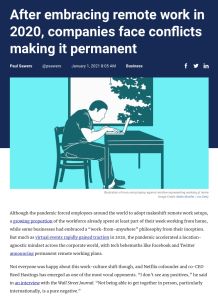Join getAbstract to access the summary!

Join getAbstract to access the summary!
Paul Sawers
After Embracing Remote Work in 2020, Companies Face Conflicts Making It Permanent
Venture Beat, 2021
What's inside?
Make sure your company’s workflow takes advantage of the benefits a remote workforce can provide.
Recommendation
Netflix might pine for an in-person workforce, but most companies are preparing for a new hybrid model. A distributed-teams strategy, where firms support team members working remotely, requires a change in how companies do business, reports Paul Sawers for VentureBeat. Asynchronous communication, focused more on iterative written communication than on endless online meetings, is only one adjustment. For large established companies, a “spoke-and-hub” model is a likely solution. New companies, trying to bloom in the COVID era, are implementing a distributed team strategy from the onset. As they grow, that is likely to become commonplace.
Summary
About the Author
Paul Sawers is a technology writer for VentureBeat. He is based in London and focuses primarily on European and British companies.




















Comment on this summary